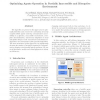336 search results - page 37 / 68 » The AML Approach to Modeling Autonomic Systems |
118
click to vote
LWA
2007
15 years 1 months ago
2007
Typical conversational recommender systems support interactive strategies that are hard-coded in advance and followed rigidly during a recommendation session. In fact, Reinforceme...
ICAC
2007
IEEE
15 years 6 months ago
2007
IEEE
In today’s complex and highly dynamic computing environments, systems/services have to be constantly adjusted to meet Service Level Agreements (SLAs) and to improve resource uti...
100
click to vote
IAT
2005
IEEE
15 years 5 months ago
2005
IEEE
The algorithm we present in this paper aims to optimally distribute and connect the community of loosely coupled middle agents ensuring communication accessibility in a dynamic, i...
107
click to vote
CAISE
2009
Springer
15 years 6 months ago
2009
Springer
Self-contextualizability refers to the system ability to autonomously adapt its behaviour to context in order to maintain its objectives satisfied. In this paper, we propose a mod...
146
click to vote
KIVS
1999
Springer
15 years 4 months ago
1999
Springer
Abstract. After introducing the concept of mobile agents and potential application domains, we motivate why mobile agent technology is an interesting concept for large Internet-bas...

